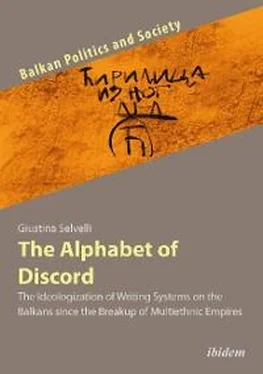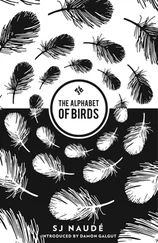The value of the Cyrillo-Methodian mission can be understood by its “revolutionary” historical value: at a time when the dogma of the three languages (Biblical Hebrew, Latin, Greek) was in force for the transcription of the Holy Scriptures, a Slavic language was able to assert itself and gain legitimacy thanks to a new work of alphabetic creation. In Shishmanov, the desire to maintain the Orthodox cultural and writing tradition coexisted with a broad international commitment at the European level, as he was one of the founders of the so-called Paneuropean Union, an embryonic version of today’s European Union (cf. Koneva 2011). Shishmanov was a great advocate of the idea of a united continent, which included respect for the rights of minorities as a fundamental value. His support for the message of Cyril and Methodius probably also stemmed from his attachment to the deeply European ideals of protecting and promoting cultural and linguistic diversity in every part of the continent.
Cyril and Methodius were “invoked” not only by Miletich and Shishmanov. Reference to their work also appeared in the reaction of an anonymous reporter published in the Bulgarian press in the Macedonian region of the Kingdom of Serbs, Croats and Slovenes, Macedonian News ( Nouvelles Macedoniennes ) (Press of the Revolutionary Association VMRO), although the two saints were credited with creating the Cyrillic alphabet and not the Glagolitic one (cit. in Tramontano 1999: 324). The use of the Latin alphabet was also condemned by the pro-Bulgarian organizations of Macedonian refugees in Sofia, who demanded the immediate introduction of the Cyrillic alphabet (cf. Michailidis 1996: 336). In an article published in the daily Word on 15 October 1925, the Bulgarian politician and journalist Georgi Kulishev expressed his opinion on the subject, referring to the memory of the Cyrillo-Methodian mission:
The great work of Saints Cyril and Methodius has been eclipsed [...] three Greek specialists [...] have graced the Bulgarian people of Western Thrace and Macedonia with a new writing and a new manual for education. It is true that this writing is not so new—it is the Latin alphabet adapted to a not very beautiful cause, a semi-barbaric one. (in: Shishmanov 1926: 4; my translation)
In the same article, the author stated that the Abecedar represented something completely unheard of and “monstrous.” The Greeks had so achieved their goal that the Bulgarians had difficulty in recognizing their own language in the manual, a language subjected to “unheard-of tortures in their martyrology” (ibid.).
Similarly, in a text published in the journal Macedonian Review ( Makedonski Pregled ) in Sofia, the historian Georgi Strezov expressed his dissatisfaction with the way the Bulgarians were treated by the Greek authorities in Aegean Macedonia, condemning the violation of their cultural and national rights (Strezov 1926: 146). Strezov affirmed that such actions stemmed from the Greek will to uproot this minority from its land and to appropriate everything that was Bulgarian by every means at their disposal—“imprisonment, exile, pitchforks, primers”—and above all by banning their language: all with the aim of “de-Bulgarianizing” Macedonia. The Greeks hence aimed to eliminate all historical evidence of Bulgarian cultural presence in the area. “But we do not want to leave, we are obedient subjects of the Greek state, and we want only one thing—to pray to God in our mother tongue and to read books in Bulgarian” (Strezov 1926: 148; my translation).
The populations in Aegean Macedonia and Western Thrace that were considered “Bulgarian” by the above-mentioned authors already possessed their own written literary tradition, comprising books, newspapers, writers, printing houses, churches, clergy and schools, one which had reached an enviable level: in short, all the cultural characteristics of an advanced society (see also Rossos 2008: 147). The decision to introduce a different writing system and deprive them of such civilizational elements was incomprehensible to the Bulgarian public and unacceptable from a moral, linguistic, cultural and religious point of view. Referring to the population in question, Shishmanov asked: “What benefit could they derive from this Latin writing system? The result will be their inability to read not only a Bulgarian book, but also a Serbian or Russian book” (Shishmanov 1926: 9; my translation).
Certainly, one can conclude that the Greek commission did not adhere to what, in modern sociolinguistics, is considered to be the basis of linguistic and orthographic planning (cf. Fishman 1977: xv). In any project aimed at introducing a new writing system for educational purposes in a speech community, there are indeed a number of crucial decisions to be made: first of all, the choice between using an existing writing system and one created specifically for that language. The proponents of script reforms cannot decide arbitrarily on this fundamental aspect, but should take into account the reaction of the native-speaking population at all stages of the planning process (Berry 1977: 5).
2.7 Conclusions: the fate of the Abecedar after 1925
The function of writing systems as a tool to represent the “distinctiveness” of an ethnic group has been familiar to national movements in the Balkans, and Eastern Europe in general, since the 19th century. In many cases, when an alphabet had already been in use for centuries but no extensive literature existed in the vernacular, it was retained and given a slightly different coloration to distinguish it from the writing system of the dominant power or of a competing ethnic group (Wellish 1978: 43). In the case of the Slavic population of Aegean Macedonia, it was the Greeks themselves who cleverly exploited this element, becoming the protagonists of a “graphopoietic” work, without realizing that they had thus set an important precedent precisely for the “Macedonian cause” that worked against their own interest.
Since one of the main characteristics of the graphic aspect of language, exceeding even the oral aspect, is the fact of its being socially controllable, writing proves to be a strong instrument of power (Cardona 1982: 6). In the Bulgarian case, the alphabet revealed itself to be an essential tool of the “symbolic cultivation” (Smith 2009) of national identity and unity, appearing as an element of continuity in the history of its people: hence, literacy practices themselves became means capable of engaging the public in official debates and rhetoric. After all, literacy itself is based on a system of symbols, since writing is a set of symbolic elements used for communicative purposes that inevitably acquires a strong social meaning (Barton 1994: 43).
At the beginning of his review of the Abecedar , Miletich noted that, despite its serious shortcomings, the text at least represented recognition of the wishes of a minority population that boldly demanded its children’s right to be taught in their mother tongue. But how closely did this statement correspond to reality? What was the fate of this school manual and what were the reactions of the affected population? Certainly, this school manual did not fulfill its intended role, which was to serve the education of local Slavophones. Rather, it represented an attempt at “imposed literacy” (cf. Barton 1994: 78) by the Greek authorities, as well as a restriction of the Slavophones’ possible literacy practices, which were oriented towards different social and religious goals.
A few copies of the controversial Abecedar reached the Slavic-speaking villages of Aegean Macedonia in early 1926, several months late due to the Incident at Petrich, the aforementioned invasion of Bulgaria by Greece. However, these copies of the primer encountered an unfortunate fate: in one village, the incomprehensibility of the text to one of the few literate inhabitants (who could read Cyrillic) led the population to throw all copies into a nearby lake (Tramontano 1999: 327). The distribution of the Abecedar in the village of Amyntaion, near Florina, proved disastrous: the residents reacted violently and burned all the books, which they considered an insult to their “Greekness” (Michailidis 1996: 341)! The inhabitants of this village, both Slavophones and Hellenophones, protested together for days, finally deciding to send a telegram to the Foreign Minister to express their exasperation at the introduction of an undesirable language into the their children’s schools. As if that were not enough, they also sent a message of protest to the League of Nations, which was published in the Greek daily Newspaper of the Balkans (Efimeris ton Valkanion) on 2 February 1926 (Michailidis, ibid.):
Читать дальше












